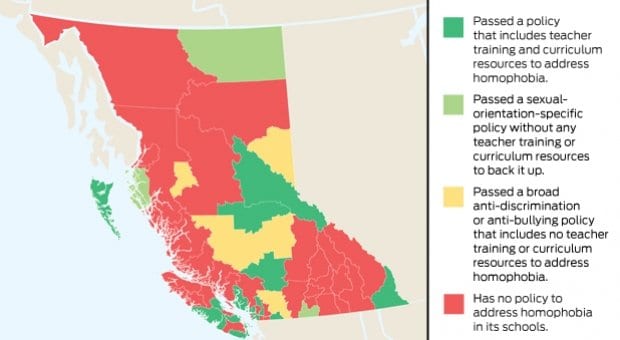Ten years ago, it was a patchwork of bigotry.
That’s how James Chamberlain described the map of BC’s school districts and the districts’ unwillingness to address the homophobia that pervaded their classrooms.
Of the 60 districts in the province, only two had passed anti-homophobia policy by the end of 2004.
Fast-forward a decade: we’re up to 29 — nearly half the districts have signed on. That may not sound like a huge change, but it is.
“In the past five years in particular, there’s been a groundswell of change,” says Chamberlain, who has been there since the beginning.
It was Chamberlain who challenged the Surrey school board to add gay-friendly books to their classrooms in 1997. Even before that, he was working with the Gay and Lesbian Educators of BC to push the BC Teachers’ Federation (BCTF) to develop its own program to help local teachers address homophobia in schools.
Convincing the BCTF was key. The teachers’ union has been instrumental in the cross-province push to develop anti-homophobia policy in the last few years.
Unlike most teachers’ unions, the BCTF has dedicated staff working on social-justice issues to develop resources for teachers on topics such as racism, homophobia, women’s rights, poverty, environmental issues, and peace and global education. In other words, they’re working to help teachers broaden our culture, one classroom at a time.
It’s certainly paying off on the gay front.
Having planted the seed, the BCTF offers interested local teachers resources to support policy development and implementation in their own districts.
Twenty-two policies passed in the last four years alone. The momentum is gathering speed.
It’s part of the public discourse now, Chamberlain says. “I think in the next couple of years, we’ll pass a tipping point: more boards with policies than without.”
Interestingly, the foundation for all this change was laid, and the momentum built, by the (mainly queer) teachers themselves, working together and with students, parents and straight allies to push for change — without government direction.
“The government has been silent on this issue since the mid-’90s,” Chamberlain says, pointing first to the NDP government, then to the Liberals. Both have had opportunity to take the lead and direct BC’s school districts to address homophobia; to date, neither has. (Though Premier Christy Clark says we need to “change our culture” and “erase bullying,” her much-touted $2 million program does nothing to directly challenge homophobia beyond prohibiting it, along with other forms of discrimination already prohibited by the BC Human Rights Code.)
“I’m not waiting for a government to act,” Chamberlain says. At this point, the policies passed at the district level are stronger and more comprehensive than anything a government is likely to pass anyway, he adds.
There are definite advantages to building together from the ground up rather than waiting for an order to be issued, then demanding it be followed no matter how grudgingly.
“A top-down approach mandates things on boards and on teachers,” Chamberlain says. “If the teachers are moving forward on something because of a change in their hearts and their minds, that’s much more powerful.”
Granted, that leaves 31 districts still without policies — a glass half empty, depending how you look at it. But Chamberlain is optimistic. And tenacious.
Asked which district he’d like to see pass a policy next, he looks to his conservative hometown of Abbotsford. “That would be the pièce de résistance,” he says with a laugh. “That would be a personal triumph.”
Is it likely? “We never thought Chilliwack would have a policy, or Surrey,” he points out. “Any district is possible if you have the right combination of people working on it.”
Robin Perelle is the managing editor of Xtra Vancouver.
Read Xtra‘s special report on the state of our schools: Less Than Half of BC’s School Districts Have Homophobia Policies.

 Why you can trust Xtra
Why you can trust Xtra


